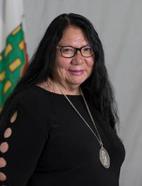Number 1,
1. Increase Indigenous Employment
It is important to confirm where the authority to establish the Affirmative Action Policy comes from. The Charter of Rights and Freedoms establishes that "every individual is equal before and under the law and has the right to equal protection and equal benefit of the law without discrimination" (Section 15(1)).
Section 15(2) provides the legal grounds for establishing the Affirmative Action Policy by enabling "any law, program or activity that has as its object the amelioration of conditions of disadvantaged individuals or groups including those that are disadvantaged because of race, national or ethnic origin, colour, religion, sex, age or mental or physical disability." The objective and intent of the Affirmative Action Policy are to increase the number of Indigenous persons who are disadvantaged and underrepresented in the public sector. Committee wants the Government of the Northwest Territories to improve the disadvantage and underrepresentation of Indigenous persons in the NWT by holding job competitions exclusively for Priority 1 candidates.
Recommendation 1: Committee recommends that the Affirmative Action Policy reflect its objective and intent and mitigate the disadvantage and underrepresentation of Indigenous persons in the NWT public sector by implementing a Priority 1-only competition.
Committee heard that decentralizing government jobs contributes to increasing Indigenous representation. This is partially due because most NWT's Indigenous population resides outside the capital city region. Therefore, more Indigenous persons would seek employment in the public sector if people could stay in communities to work. The Government of the Northwest Territories should review the jobs at headquarters in Yellowknife, identify positions to be moved to the regions, and allow jobs to be relocated.
Recommendation 2: Committee recommends that the Government of the Northwest Territories identify which headquarters positions can be located to the regions, which jobs could be tagged as flexible and moved among a number of locations, and those that could be classified as remote working arrangements, aiming to allow Priority 1 employees to work in the community of residence.
2. Appeals Process
Committee received several comments from the public about the need of transparent appeals process when Indigenous candidates have not been hired. Residents noted that politics and political biases are often involved in hiring in small communities and recommend creating an independent review body for oversight and appeals.
Not being informed about one's rights when feeling treated unfairly breaks more than not only trust. Improvements need to be made toward a clear and public description of the appeal process. The right to appeal allows the appellant to bring forward their view on a decision, and an appeal can result in reversing a decision.
Committee heard that since 1967, over time, non-Indigenous employees have fine-tuned the governmental operation to put their own people into the government, leaving Indigenous persons out. Such loss of trust flags the urgent need to lay the groundwork for building confidence and assurance that Indigenous participation will increase in the public sector.
The Union of Northern Workers can also play a role in imparting trust in the public sector by looking after their employees with an Indigenous complaints process. Indigenous employees need to know they are protected.
Committee is concerned that the GNWT does not have enough independent oversight regarding hiring decisions. Committee also notes that current Indigenous staff and the diversity and inclusion unit are uniquely positioned to support Indigenous candidates as they navigate the hiring process. Committee therefore recommends:
Recommendation 3: Committee recommends that the Government of the Northwest Territories establish one uniform, clear and accessible appeal process for public service positions that:
- Establishes a mechanism empowering Priority 1 candidates with the ability and enough time to appeal a hiring decision before a job is offered to a non-Priority 1 candidate.
- Operates independently at arms-length from the government.
- That an appeal body that is representative of the Indigenous population with a minimum Indigenous membership of 50 percent.
- Clearly outlines how appeals can be requested and considered.
- Contains clear terms of reference for a fair and consistent appeal process.
- Ensures availability and accessibility of support by Indigenous staff of the diversity and inclusion unit to the Indigenous candidate.
I will now pass this on to the MLA for Inuvik Twin Lakes.
